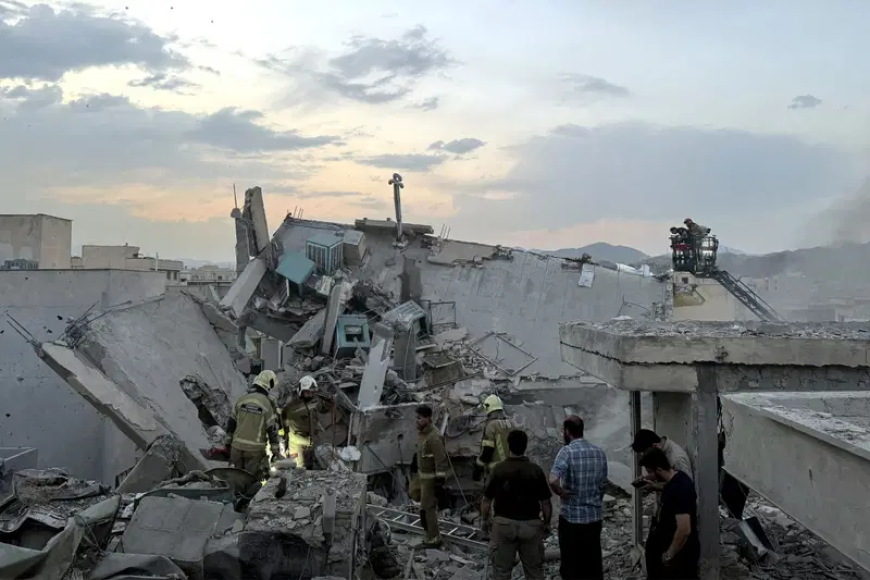Top Iranian generals killed in Israeli attack

Israel targeted leading members of Iran’s armed forces on Friday during its unprecedented onslaught hitting military and nuclear targets across the country.
Here is what we know about the two top figures killed:
Armed forces chief of staff Bagheri –
General Mohammad Bagheri was the highest-ranking officer in the Iranian armed forces and was responsible for overseeing the army, the Revolutionary Guards and Corps and the country’s ballistic missile programme.
In office since 2016, Bagheri worked directly under the authority of supreme leader Ayatollah Ali Khamenei — Iran’s ultimate decision maker and the commander-in-chief of its armed forces.
As second in command, Bagheri held wide-ranging authority over much of Iran’s military formations and appeared regularly on television in uniform — including notably at the inauguration of underground military bases.
He also played a key role in developing Iran’s ballistic missile programme.
The arsenal, originally developed to compensate for Iran’s weak air force during the Iran-Iraq war in the 1980s, significantly increased its range and precision over the years.
Israel has long viewed these capabilities as an existential threat from its sworn enemy and has twice been targeted by massive barrages fired by Iran at its territory.
“The Zionist enemy should know that it is nearing the end of its miserable life,” Bagheri once declared, while referring to Israel as “a cancerous tumour”.
In 2022, Bagheri stated that Iran was “more than self-sufficient” in arms and equipment, boasting that the country would become one of the world’s top arms exporters if sanctions were lifted.
The general was placed under US sanctions during President Donald Trump’s first term and later sanctioned by the European Union following the outbreak of the war in Ukraine
At that time, Bagheri mocked the EU, suggesting it should use Iran’s frozen assets to “buy coal” to heat itself in winter amid Russia’s war in Ukraine aided by Iranian weapons.
Born in June 1960, Bagheri succeeded Hassan Firouzabadi, who had served as chief of staff of the armed forces for 26 years — from 1989 to 2016 — and had once accused Westerners of using lizards to spy on Iran.
– Revolutionary Guards commander Salami –
Iran’s Revolutionary Guards chief Hossein Salami was a veteran officer close to supreme leader Khamenei and known for his tirades against Israel and its US ally.
“If you make the slightest mistake, we will open the gates of hell for you,” the white-bearded general warned Tehran’s arch foes during a tour of an underground missile base in January.
Born in 1960 in central Iran, Salami joined the Islamic Revolutionary Guard Corps in 1980 at the start of the war launched by then Iraqi leader Saddam Hussein.
He spent most of his career in the Guards, which was set up after the 1979 overthrow of the Western-backed shah to defend the goals of the Islamic revolution.
The force is now 125,000-strong grouping, according to the International Institute for Strategic Studies, although Iran has never released any official figure.
Salami rose through the ranks to become head of the Guards’ air force division and was placed on Washington’s sanctions blacklist.
He served as the corps’ deputy commander for nine years before being promoted to the top job in 2019 as part of a major reshuffle.
Iran’s revolutionary leader Ayatollah Ruhollah Khomeini had made support for the Palestinian cause a centrepiece of Tehran’s foreign policy and Salami repeatedly alluded to calls for Israel to be wiped from the map.
Israeli Prime Minister Benjamin Netanyahu should “learn to swim in the Mediterranean Sea” in readiness to flee, he said in a 2018 speech.
The Revolutionary Guards played a central role in Iran’s forward foreign policy in the Arab world, which saw Tehran-backed militant groups Hamas and Hezbollah lead Gaza and Lebanon into war with Israel.
The twin conflicts were accompanied by the first-ever direct exchanges of fire between Iran and Israel last year and were to lead to the much bigger wave of Israeli strikes on Iran on Friday, one of which killed Salami.

 admin
admin 


